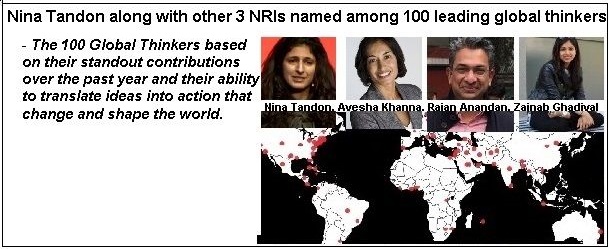Nina Tandon along with other 3 NRIs named among 100 leading global thinkers

Los Angeles, Dec. 02, 2015
NRIpress-Club/Gary Singh/Ramesh
NRIs all over the world, showed that progress is possible, whether in corner offices or on factory floors.
Each year Foreign Policy identifies the top 100 Leading Global Thinkers. The 100 Global Thinkers based on their standout contributions over the past year and their ability to translate ideas into action that change and shape the world. Honorees include a wide range of leaders, advocates, innovators, artists, government officials, and visionaries from around the world.
Innovators – An iPhone app that serves as eyes for the blind. A device that turns a smartphone into a microscope capable of diagnosing tropical diseases. A process for growing new bones in a lab using human stem cells.
The people use social media to build unprecedented political movements, offered safe spaces for discussion in societies that restrict free speech,
2015 showed that some wounds can in fact be healed. Historic agreements with Iran, Cuba, and Greece all emerged from months, even decades, of hard-fought, spirited negotiations. In 2015, the Global Thinkers are particularly diverse: Just as the globe’s intractable problems aren’t confined neatly to the realms of politics and policy, neither are the individuals imagining innovative solutions. These thinkers are artists and activists, medical experts and entrepreneurs, scientists and pop singers — and they hail from nearly every continent. And, for the first time ever, the list includes more women than men.
More than 40 years ago, against the backdrop of an America torn apart by Vietnam— Foreign Policy magazine was founded by Harvard professor Samuel Huntington, a one-time hawk, and his close friend, Warren Demian Manshel, a dove.
Foreign Policy-FP Group reaches an international audience of millions and has become a trusted source of insight and analysis for leaders from government, business, finance, and the academic world. FP is committed to continuing to innovate through partnerships that utilize new technologies, new media and creative new approaches to bring together those leaders to better understand and address the most urgent and important issues of our time. FP is a division of the Graham Holdings Company.
Nina Tandon
Nina Tandon works on growing artificial hearts and bones that can be put into the body, and studies the new frontier of biotech: homes, textiles, and videogames made of cells. She is CEO and co-founder of EpiBone, the world’s first company growing living human bones for skeletal reconstruction. She is the co-author of Super Cells: Building with Biology, a book that explores the new frontier of biotech.
She has a Bachelor’s in Electrical Engineering from the Cooper Union, a Master’s in Bioelectrical Engineering from MIT, a PhD in Biomedical Engineering, and an MBA from Columbia University. Her PhD research focused on studying electrical signaling in the context of tissue engineering, and has worked with cardiac, skin, bone, and neural tissue. She is Adjunct Professor of Electrical Engineering at the Cooper Union and a former Staff Associate Postdoctoral Researcher in the Laboratory for Stem Cells and Tissue Engineering, Columbia University.
She has spoken three times at TED, and was named one of the 100 Most Creative People in Business by Fast Company. She has published 10 journal articles (cited > 300 times, H = 9) and six book chapters, and she has three patents. She is the co-author of Super Cells: Building with Biology, a book that explores the new frontier of biotech.
She was named one of the 100 Most Creative People in Business by Fast Company, a Crain’s 40 under 40 people who have achieved success in business before turning 40, and a World Economic Forum Tech Pioneer.
–
Four PIOs named among 100 Leading Global Thinkers
Washington, Dec 2, 2015:
Four persons of Indian origin are featured in Foreign Policy magazine’s list of 100 Leading Global Thinkers who have generated ideas that could promise humankind a better future.
Featured among ‘Innovators’ whose work has advanced “progress in global health, human rights, security, and more” is Nina Tandon, co-founder of Epibone, New York City, “For healing broken bones by growing new ones.”
Typically, to reconstruct bone, surgeons must take bone either from somewhere else in a patient’s body, necessitating a double surgery, or from an outside source, such as a prosthesis or a donor.
But Tandon has created a third way: Growing new bones. A patient’s stem cells are placed in a bone-shaped mold, which is then put into a special chamber that simulates the body’s temperature, nutrient composition, and other conditions.
After three weeks, the cells have essentially formed a new bone. This method requires only one surgery and avoids implanting foreign materials, thereby reducing pain and complications, Foreign Policy noted.
EpiBone has successfully replaced the jaw of a pig and is gearing up to start its first clinical trials, to be held within two years.
Among the ‘Moguls’ who have “showed that progress is possible, whether in corner offices or on factory floors” are Rajan Anandan, managing director of Google, Southeast Asia and India, and Ayesha Khanna, founder of the Civic Accelerator, an investment fund for socially conscious enterprises.
While Sri Lanka-born Anandan is included “For lobbying on behalf of the unconnected”, Khanna gets in “For nudging women into the corner office”.
Anandan “has used his stewardship of Google in India to greatly improve tech access for the poor by successfully lobbying Indian manufacturers to launch low-cost phones, pushing carriers to bring down the prices of data plans, and increasing the translation of Google products into many Indian languages.”
“Beyond that, he’s also one of the country’s most active tech investors: Between January 2014 and June 2015, he was the most prolific, according to Quartz, investing in 15 start-ups.”
“Anandan’s work simply proves that good business doesn’t have to be at odds with good citizenry,” FP said.
In November 2014, Ayesha Khanna and Shannon Schuyler, head of corporate responsibility at PricewaterhouseCoopers (PwC), pooled resources to help women gain access to capital.
This spring, with PwC funding, Civic Accelerator’s cohort of 13 US start-ups – all of which had at least one female founder, and 11 of which were started entirely by women – participated in a 10-week boot camp to test ideas and connect with investors.
Khanna and Schuyler have pledged that at least half of future Accelerator-supported ventures will be owned by women.
Featured among ‘Challengers’ who have “proved that even sacred cows can be toppled” is India-born Zainab Ghadiyali “For cracking the STEM ceiling.”
In Menlo Park, California, Ghadiyali and Erin Summers, both engineers at Facebook, are running “wogrammers,” a movement to end the “brogrammer” stereotype and highlight the technical accomplishments of their peers.
In its first year, wogrammers highlighted 50 female engineers from around the globe……IANS

|



